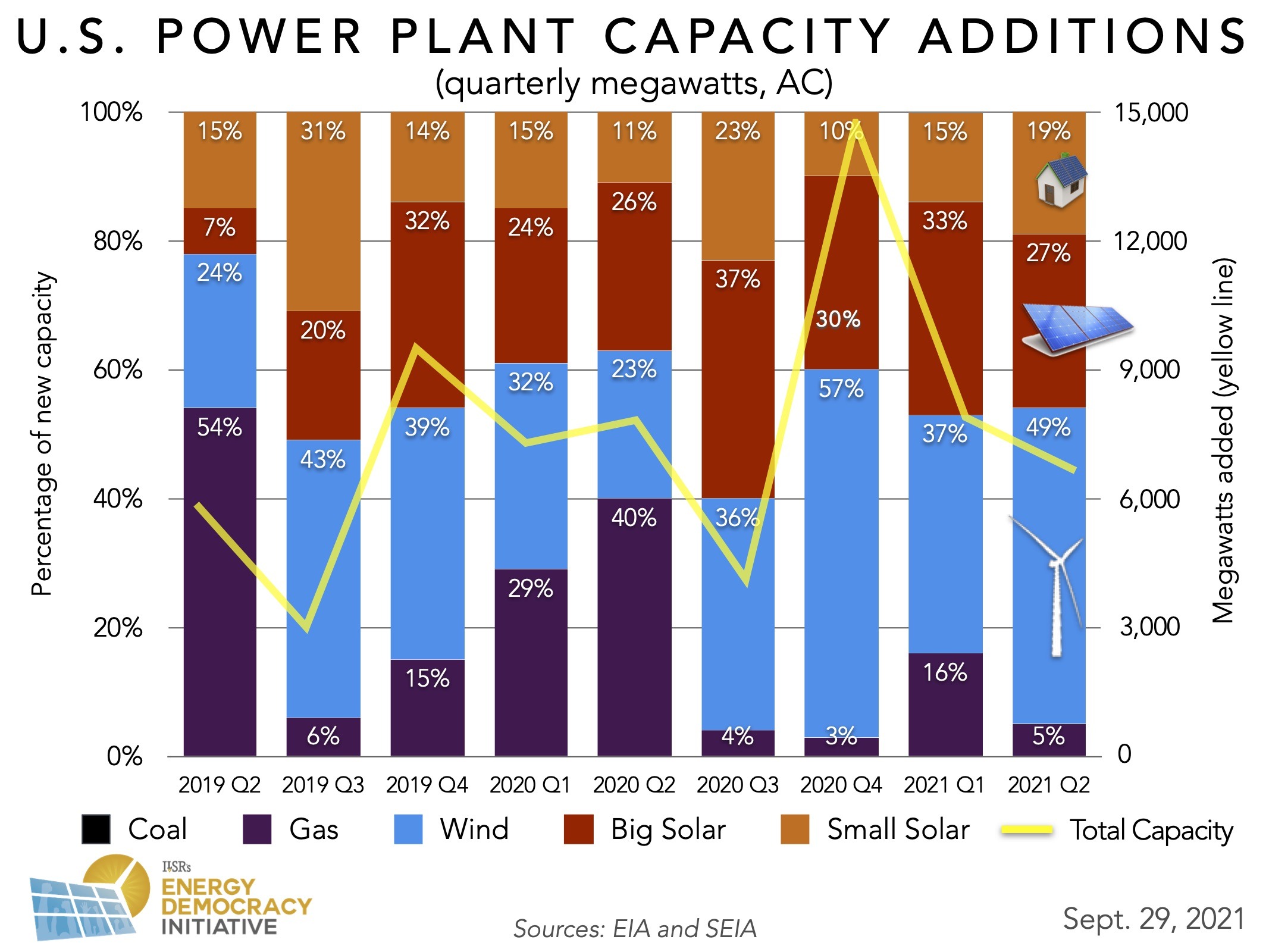Originally published on ILSR.org
Nearly seven gigawatts of new power generation capacity came online in the second quarter of 2021. Renewable energy generation capacity growth was comparable to last quarter, while new fossil gas construction dropped dramatically. In four of the last eight quarters, the fossil gas contribution to new power generation capacity has been less than 10 percent. It has been two years since fossil fuel plants made up the majority of quarterly added generation capacity.
In the chart below, we illustrate the past two years of new power plant capacity in the U.S., disaggregated by energy source on a quarterly basis.

Wind picks up large solar’s losses
After contributing over 30 percent of quarterly new power generation capacity for the last three quarters, utility-scale solar has lost some steam. 1.8 gigawatts of utility-scale solar came online this quarter, compared to 2.6 gigawatts in the first quarter of 2021. The solar industry as a whole is facing some supply constraints, according to the Solar Energy Industries Association (SEIA) and Wood Mackenzie.
The development of the wind industry, on the other hand, picked up slightly this quarter. 3.3 gigawatts of wind generation capacity were installed in the second quarter of 2021, compared to just under 3 gigawatts in the previous quarter. Wind power made up nearly half of all generation capacity added this quarter, making wind the largest contributor to new power generation capacity for three straight quarters. All of the wind capacity built out in the second quarter of 2021 was onshore.
Demand for Distributed Solar is Only Growing
Distributed solar had a strong showing in the second quarter of 2021, showing a slight edge over an already impressive first quarter. The 100-megawatt quarter-over-quarter increase in generation capacity growth can be attributed to increases in residential, commercial, and community solar.
Watch as community solar progresses nationwide in our National Community Solar Programs Tracker.
According to SEIA and Wood Mackenzie, most residential solar was installed in California, Florida, or Texas. In California and Texas, the electric grid has shown itself vulnerable to failure or wildfire-induced shutoffs. Residents recovering from shut-offs and massive grid failures have every reason to find resilience through solar.
The federal solar investment tax credit is not scheduled to step down into 2022, so 2021 may not see the same end-of-the-year solar push as seen in previous years.
Gas buildout grinds to a halt
Only nine gas plants were built in the second quarter of 2021, with a total nameplate capacity of 346 megawatts — the lowest second-quarter for gas on record. Only the third quarters of 2019 and 2020 had lower showings for gas buildout. Could the third quarter of 2021 set a new quarterly low for gas?
Gas has contributed less than 10 percent of new generation capacity in four of the last eight quarters. Given current trends toward higher gas prices and proposed federal policy, it is unlikely that conventional fossil gas will ever be a majority of new power plant capacity again.
Interested in earlier trends and analysis of new power plant capacity? Check out our archive, illustrating how electricity generation has changed in previous quarters and years.
This article was originally posted at ilsr.org. For timely updates, follow John Farrell on Twitter or get the Energy Democracy weekly update.
Featured Photo Credit: U.S. Department of Agriculture via Flickr (CC BY-ND 2.0)